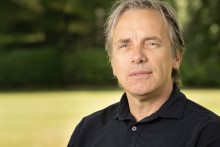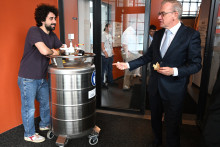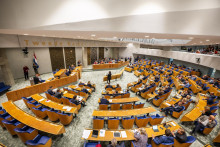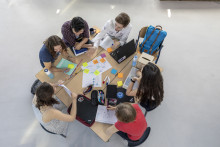When they met for the first time, it felt as if they already knew each other. Kafyulilo is from Tanzania and Dutch researcher Gervedink Nijhuis has spent extensive time in Ghana. Both are interested in the best way to integrate Western pedagogical methods into the African educational system. Gervedink Nijhuis' research topic is how culture influences curriculum design processes in the context of international cooperation. And Kafyulilo is here studying the best techniques for integrating technology with pedagogical choices, student flexibility, and classroom content.
Gervedink Nijhuis works in the department of Curriculum Design and Educational Innovation, under the Faculty of Behavioral Sciences. Kafyulilo teaches secondary school teachers at Dar-es-Salaam University College of Education and has personally struggled to complete his own education. Even though he never worked with a computer until university, he now is an expert in educational media and technology, and science teaching methods.
Together they sat at a small table in Gervedink Nijhuis' office in Cubicus one afternoon. Each offered a unique and compelling perspective on the integration of Western technology and techniques in the African classroom.
What are the challenges facing secondary school education in Tanzania and Ghana?
AK: `When we start looking at the challenges, we have to start with basic requirements. In Tanzania, 80% of the population is without electricity. There is a huge gap between public and private schools. Some public classrooms are held under a tree! Fees for public schools are about € 50 per year and for private schools, € 500 per year. How can you begin to talk about computers? Most rural children have never seen a computer and their teachers don't know how to use word processing software or the internet, never mind how to implement computer learning tools into their curriculum.'
CGN: `I agree. The first thing to do is access basic conditions. Is there water? Is there electricity? Then much later, you can determine how best to integrate technology. For example, shifting the teacher's role to a student-centered curriculum is a huge adjustment.'
AK: `Yes. Role-playing and class discussion takes more time to prepare than a lecture. And most teachers are already working twelve-hour days and only earning € 65 a month.'
CGN: `You have to understand that we are talking about an entire system which needs to be overhauled. You can't just change one thing, and your approach has to be from both sides — top-down and bottom-up. You have to change perceptions about teaching and learning. You need to get everyone on board, not just a lone teacher. That includes the government.'
AK: `Yes, much is decided by the country's Ministry of Education — how students are accredited, course material, and exams. This limits teachers' creativity. Any changes must first be approved by the government. So school changes are not practical. Only the more expensive private schools can easily implement them.'
Are there any Western ideas that can help with all this?
CGN: `Actually, there are many projects in progress and success stories. The key is that any improvements don't have to be like our system. We shouldn't really compare the two.'
AK: `In Tanzania, education has improved greatly due to international policy. Primary Education Development Program (PEDP) in Tanzania helped to build schools and improve the quality of education. Before PEDP, about 800,000 of children attended primary school, now almost 1.6 million are enrolled. And while only one in ten used to continue their education, now almost 40% attend secondary school.'
`But we don't have the secondary school teachers, classrooms or books for all these enthusiastic students! Not to mention desks, labs or dormitories. During my time in high school, I had to study by kerosene lamp at night, because we had continual power outages. We really need a long term, systematic plan.'
CGN: `Yes, the polytechnics are lost between funding for primary schools and universities. In Ghana, the Netherlands Universities Foundation for International Cooperation (NUFFIC) supports students' education through scholarships and international projects. But the key, again, is to bring the ideas into the context of the local culture.'
AK: `I think that the best way to bring Western ideas into African culture is to have African students go abroad to study. They can then bring back the techniques that best suit the African context.'
CGN: `And it's important to remember that Westerners can also provide new perspectives to problems. But Westerners need to facilitate, not dictate, the transformation process. We need to be open in our approach and support the local people.'
How can we combine the Western and African perspectives into a new entity?
AK: `We need close cooperation and equality. We need to be able to share ideas at the same level.'
CGN: `Here in the West we have more access to libraries, the internet and money. But local people can make a huge contribution to determine what can and cannot work within their context. We aren't even entirely clear in the West what can happen here when you add technology to the classroom.'
`We Dutch are especially good at creating plans and schedules, but in Ghana, this kind of work can be more intuitive. They would often look at the schedules and then ask me, “Why not leave some space for God?” or “Time is like the sea, we have plenty of it.”'
 |
| Gervedink-Nijhuis (seated, third from right) with the facilitators and participants of the professional development program in Bolgatanga, Ghana. Gervedink-Nijhuis traveled to the Gold Coast of Ghana 14 times to work on a case study that aimed to improve management and leadership in polytechnic colleges. She is in the final year of her PhD project. |







